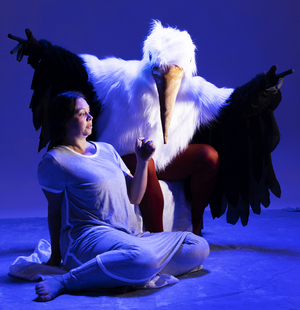Review: BABEL: A Challenging Work in Progress at Scoundrel And Scamp
Season opener has ups and downs

You only have to scan the lineup in Scoundrel and Scamp's 5th season to acknowledge the company's commitment to serious and enlightened theatre work. Given its efforts to expose the community to an array of new, inventive works, S&S situates itself in the rare company of local vanguards shaping the theatrical landscape before us.
Having said that, trailblazing the road rarely traveled usually comes with substantial risks. The menu may entice the palate, but the cuisine must live up to its description. Numerous elements must come together to produce one's desired outcome.
Scoundrel and Scamp submits a determined effort but doesn't quite cohere the pieces of an already problematic play. The material certainly doesn't lack in research, but the narrative is spotty and cold, at best. The dialogue, by turns fluid and brisk, is also repetitive.
BABEL, by Jacqueline Goldfinger, draws a dystopian account of a not-so-distant future where the circumstances are compelling enough to jolt us out of smug complacency. It's a dark commentary on our worst human impulses, albeit laced with occasional humor. Goldfinger conveys a cautionary tale of what we stand to lose as we conjoin technology's eminence with our desire for ultimate power.
Inspired by the British TV mini-series Black Mirror, this 90-minute experiment explores a world where potential parents are made to pre-certify their babies (embryos, really) to determine their fitness to live in society. If it sounds familiar, it's because eugenics not only returns as a viable ideology in Goldfinger's imagined future; it is the enforced social policy to address the problems of overpopulation, water shortage, and climate change.
In BABEL's world, what better way to preempt genetic disorders than in utero testing? Autism, ADHD, and other psychological "abnormalities," including criminal predisposition, can be eliminated with the help of advanced technology. If a baby is deemed "uncertifiable," a couple can decide to abort and "start again," or risk having the baby grow up in a secluded location and consigned to a life of manual labor -- an apt euphemism for a prison camp.
In other words, we wouldn't have to live amongst those we perceive to be society's deviants, those who think differently and behave in idiosyncratic ways. We'd be forced to upgrade to a gentrified and antiseptic world sans artists and shamans, God forbid.
Scoundrel and Scamp's cinematic premise is intriguing enough. Featuring a charming, monochromatic interior bathed in silky late-evening wash, director Bryan Rafael Falcón lures our eyes with a clever arrangement of four moving white screens across the stage, on which video footage and transitional text are projected. Behind the screens, separated by a sofa, are two beds on opposite sides, indicating two separate homes inhabited by two separate couples who happen to be the best of friends.

Behind the screen stage right, we meet Dani and Renee, a lesbian couple who are expecting a baby after eight years of trying. On stage left, we're introduced to Jamie and Anne, who are also expecting. Dani and Renee's baby is uncertified (while Jamie and Anne's is allegedly perfect), which qualifies it as the play's central conflict. Dani refuses to believe Renee's test results and insists on being able to change the doctor's mind so he might sign the certificate. While aborting the child is a safer option, Renee is not averse to raising a child who may or may not turn out to be as predicted.
A talking stork is an attractive diversion, providing the surreal reprieve from the grating nightly banter between Dani and Renee. The stork may exist only in Renee's mind, but a later scene reveals a bizarre deus ex machina which will not be spoiled here.
There's an alternate theatrical assessment in my mind where BABEL could work as a dynamic piece of theatre, performed by an ensemble that is nuanced in technique and galvanized by a clarity of subtext. Alas, the cast of Scoundrel and Scamp has yet to get there. We've seen fitful moments of truth-telling and discriminating choices, as exhibited by Callie Hutchison as Dani and by Ariel Cheng as Anne. Sean Patrick is a vulnerable Jamie, but director Falcón could tighten those interminable pauses between speeches and help the actor along in completing his action sooner than later.
Last but not least, Elizabeth Falcón's Renee could use our empathy as she trudges through a grueling moral dilemma, but we find ourselves exhausted much too early in her journey. She opens the play with a brilliant series of non-verbal exercises, which rightfully elicits a few laughs. Then she finds out the bad news in her doctor's office, a pivotal moment in her arc where Ms. Falcon might do well to consider Elizabeth Kubler-Ross' beginning stages of grief. Instead, Renee panics early and she does not relent. There's a predictable danger when an actor peaks too soon: There is nowhere else to go and we are left ruing the actor who is reduced to insufferable whining.
I believe we're supposed to discern Goldfinger's critical appeal to find a basic sense of humanity in a world dominated by technology's hard, cold grip. At the very least, we ought to remind each other of the urgency to do something about our global ills before it's irreversibly late. The playwright makes a salient point in her final scene, which happens to be Ms. Falćon's best moment, at the beach, hand on her belly, heralding the birth of a child who will change the world.
It's a good reminder that the folks at Scoundrel and Scamp have their work cut out for them and there is much to look forward to in a season aptly dubbed, "Dreams of a New World."
BABEL continues through October 3, 2021
Photo Credit: Tim Fuller
For tickets, contact boxoffice@scoundrelandscamp.org ~~ 520-448-3300
The Scoundrel and Scamp Theatre ~~ 738 N. 5th Avenue, Suite 131, Tucson, AZ 85705
Reader Reviews

Videos

